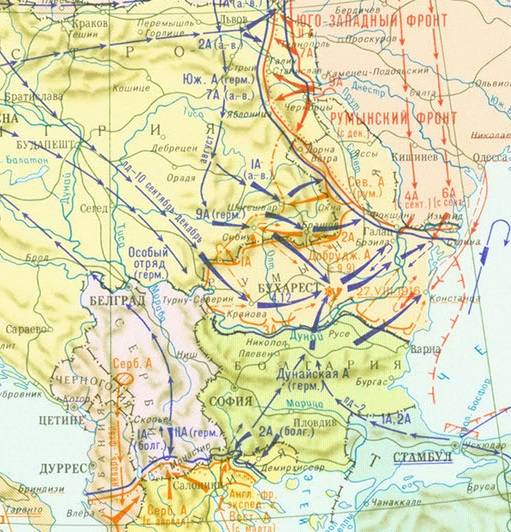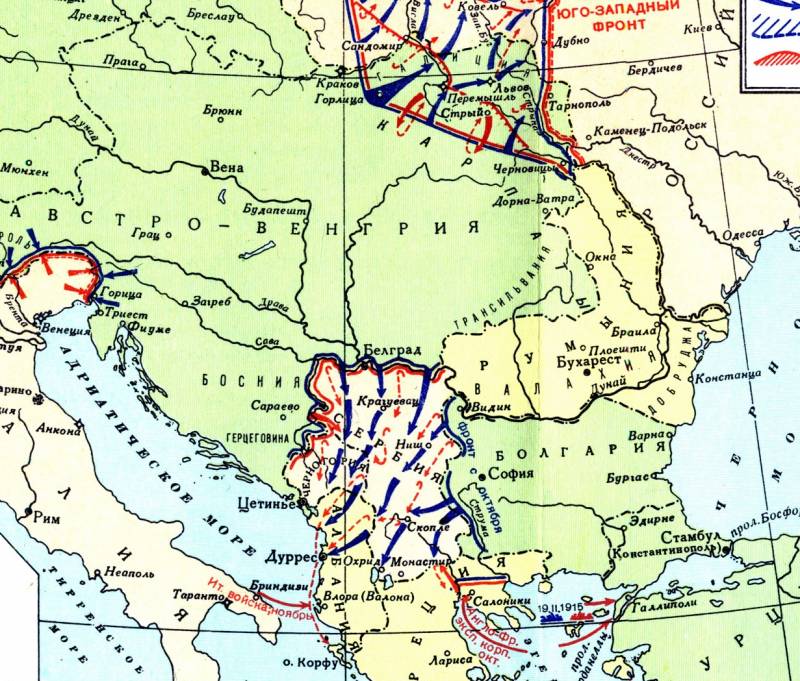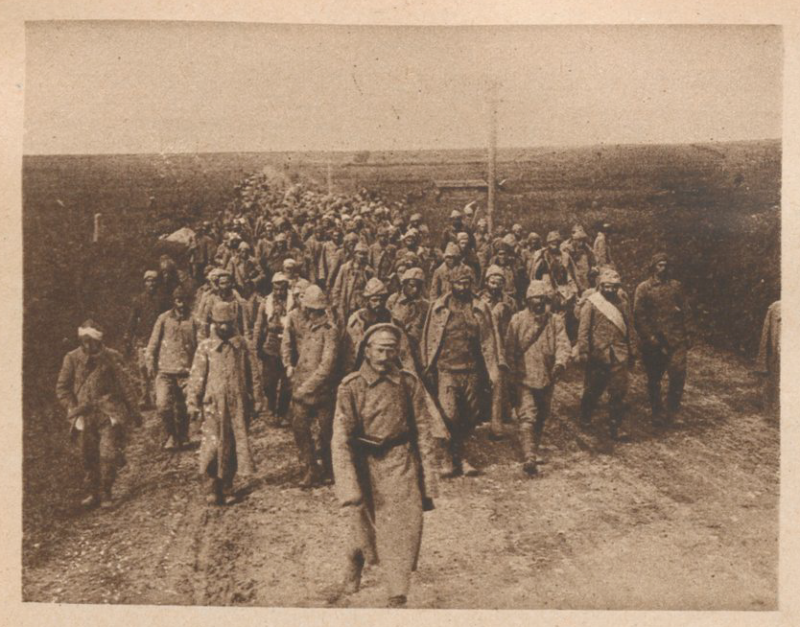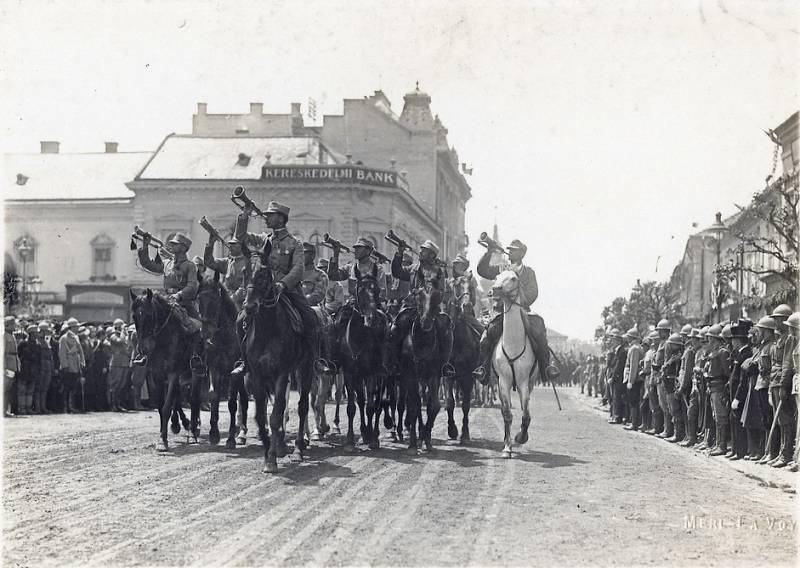Romania in the First World War
In Bucharest, by this time it was decided that it was better to be in the anti-Austrian coalition. Victory as part of this coalition promised participation in the section of Austria-Hungary. Romania hoped to grab Transylvania, among other things, where several million Romanians lived. What was meant was not only the national task of reuniting the Romanians. Transylvania was richer than Romania itself, there was something to put a paw on. In addition, the Romanians really wanted to assign the property of German shareholders in their country.
The outbreak of a major war caused an ambivalence in Bucharest - both fears and hopes. The war gave a chance to achieve territorial increments, joining the side that wins. But who will win? The Romanian elite was very afraid to miscalculate - to act on the side that will lose. Bucharest was at a crossroads. If the Entente had won, then by joining it, it would have been possible to get Transylvania. But if the central powers won? Then you could join them and take Bessarabia. But it was necessary to join someone.
The Romanians for the most part wanted the Entente to be the winning side. The idea of speaking on the side of the Entente gathered big demonstrations, had a lot of activists and administrative support. There were also supporters of a speech on the side of the central powers, but they were few and inconsequential. As an example, the Romanian king (by the name of Hohenzollern) is given - which did not even affect his own antanthophilous spouse.
In the autumn of 1914, news came of the victories of the Entente in the Marne and Galician battles. The defeated Austro-Hungarian army retreated. Russian troops occupied Bukovina. This further aroused Bucharest, he himself was counting on Bukovina, the southern part of which is inhabited mainly by Romanians. Romanian newspapers yelled: “Let's cross the Carpathians! The hour has come! Free the brothers! ”
The Romanians began negotiations on the topic of their entry into the war on the side of the Entente. They sought to sell their performances at a higher price and bargained with gipsy passion. The Romanians wanted to get all of Bukovina, as well as Transylvania, even Hungary to the bend of Tisza, the Serbian part of Banat, and that’s not all. And all this is not for joining the war on the side of the Entente, but for neutrality, simply for not opposing the Entente. However, the Entente countries responded with irritation: Romania could hope for territorial increments only by entering the war against the central powers.
Negotiations dragged on. Even getting a concession for a concession, the Romanians did not go to concrete agreements. At the same time, they continued to maintain contacts with Austro-Germans. Romanian representatives eagerly listened to promises - what will they get for speaking on the Austro-German side. Romania has provided its territory for the transit of military goods to Turkey.
However, there were also objective reasons that restrained Bucharest from immediately speaking out for the Entente, and directing it to the path of double-dealing, bargaining and winning. One of the reasons was Bulgaria. In 1913, the Romanians struck in the back with the Bulgarians, taking advantage of the fact that the Bulgarian army was constrained by its opponents in the 2 of the Balkan war. As a result of the attack, part of Bulgarian territory was captured - southern Dobrudja. After that, the Romanians were afraid that the Bulgarians would do the same to them - they would strike in the back when the Romanians concentrated against Austria-Hungary.
The Romanians in the negotiations insisted on securing their border with the Bulgarians. Specifically, this meant: if the Bulgarians oppose the Romanians, then Russia must stand up for the Romanians against Bulgaria. Of course, in Russia no one smiled at fighting for the Romanian conquest.
Another problem of Romania was the poor equipment of its army. Own military industry in the country was rudimentary. Plus, corruption - the budget allocated for the army did not reach it all.
Another “plug” for Romanians was the problem of the Black Sea straits. Romanian trade mainly went by sea - through the straits. If Russia was established in the straits, then the Romanian import-export was under Russian control. Therefore, the prospect of Russia's approval in the straits made Bucharest no less alarming than London. But in the spring of 1915, Anglo-French operations began in the straits and Bucharest calmed down a bit.
1914 went to 1915. Negotiations continued. Meanwhile, the scales were staggering. Serbs counter-strike Austro-Hungarians rejected. From Italy came the information that this "Latin Romanian sister" is also inclined to speak out against Austria-Hungary. Romanian supporters of entry into the war for the Entente launched a noisy campaign. But the ruling group headed by Prime Minister I. Brattianu decided to wait a little more. And on May 2, the 1915 launched an Austro-German offensive on the Eastern Front. The Russian army was forced to retreat. The Allied operation in the Dardanelles ended in defeat. Bulgaria entered the war on the Austro-German side; Serbia was defeated. Romanian proantanthic enthusiasts are silent.
Bucharest has decided to remain neutral. Instead of a hike through the Carpathians, the Romanians took up trade. The war inflated the prices of grain and cattle, which, together with oil, were the main items of Romanian exports. Austro-Germans bought everything. Romania has become a country like Denmark - neutral, profiting from trade with desperately warring countries. However, not quite Denmark made money on Danish deliveries to Germany. Specifically, a handful of so-called goulash-barons was enriched, but the people from the alien war received only difficulties. Food has jumped in price not only for German importers, but also domestically. In Romania, these contrasts were even stronger; on the Austro-German import, only an oligarchic group has profited.
The 1916 year has come; in May-June, the Russian troops made the Brusilov breakthrough. The defeat of Austria-Hungary was impressive. And here in Bucharest were frightened of being late for the war. After all, Austria-Hungary (or even just Hungary) could conclude a separate peace with the Entente - and then why would anyone need Romanians?
Negotiations on the performance of Romania intensified. Against this was the Russian General Staff - it was considered more profitable to maintain the neutrality of Romania. But the Western allies, especially the French, insisted on Romanian involvement at any cost. Moreover, it was not them who had to pay. France's human resources were close to exhaustion, the new front in the Balkans was to divert at least some enemy forces. Romanians agreed to their terms of entry into the war. But then Brattianu began to extort more concessions, it took another two months to agree on them. In the meantime, the Brusilovsky breakout was exhausted, the Austro-Germans stabilized the front. 4 August 1916 Romania finally joined the Entente. 14 August Bucharest declared war on Austria-Hungary, hoping that this is all. But August 19 declared war against Romania in Germany, and then Bulgaria.
The Romanian command divided its forces: 370 000 man and 185 batteries to the north against Austria-Hungary; 140 000 people and 80 batteries south, against Bulgaria; 50 000 made up the reserve in the middle. In all, 1 200 000 people were mobilized during the war.
"The generals are preparing for the last war" (Winston Churchill). The last war for the Romanian generals was an attack on Bulgaria in 1913. Then the Bulgarian army was tightly constrained on other fronts, there was no one to put up against the Romanians, and they almost met no resistance. In 1916, the Romanians counted on something similar — not battles, but a triumphant walk, while Austro-Hungarians were shackled on other fronts. At first it was. But then quickly began to increase complications that have fallen into a catastrophe.
Bulgaria remembered 1913 well. In general, the Bulgarian troops did not surpass the Romanian counterparts. However, the Bulgarians focused on several points - the attacks against them were successful. Romanian headquarters panicked, the offensive in Transylvania was stopped. The central powers got time to transfer reserves to the Romanian front. In October, their counteroffensive began.

Romanians were taken in ticks from the north and south. In November, the central block launched an offensive against Bucharest. The Russian command recommended that the Romanians keep the army, which means retreat, giving Bucharest without a fight. The Romanian generals hesitated, but still gave the battle and were defeated again. 6 December 1916 The Germans entered Bucharest. The Romanian army collapsed, on 17 December 70 thousand people remained in the divisions at the front.
The remnants of the Romanian army rolled back to the northeast, to Moldova. Millions of civilian refugees rushed there. The flight began in the autumn thaw, then hit the winter frost. Most of the food supplies went to the advancing enemy, so the famine began. For hunger and cold came the typhoid epidemic.
In general, the Romanians won, won, but still lost with the moment of entry into the war. Speak out in 1916 in June - they would take part in consolidating the success of Brusilovsky. But they were too late; speaking in August - when the Brusilov breakthrough was already stuck - the Romanians received a quick revenge of the central powers.
Although Romania entered the war later than the others, it was no less affected than others. Its population numbered more than 7 million; the losses are not exactly known, according to a lower estimate, 220 000 soldiers were killed (120 000 killed in battle and died from wounds, 30 000 from diseases, 70 000 died in captivity), and 270 000 civilians (120 000 from war veterans, too, in the dissents of the military, in disagreement of the military, in their part, in disagreement of the military, in their defense, in disguise, of 150 000 300 of civilians (000 400 in captivity), as well as in disagreement of the military, in disagreement of the military, in their defense, in defense of the military, in defense of the military, in war, 000 XNUMX XNUMX of civilians (XNUMX, XNUMX, in hardening of war, in defense of the defense, in defense of the hind. from hunger and epidemics). According to other estimates, more than XNUMX XNUMX soldiers and more than XNUMX XNUMX civilians died - about one in ten.
Romanian prisoners under the escort of the Turks.
By the beginning of 1917, there was a threat that, in pursuit of the fleeing Romanians, the enemy troops would invade the southern regions of Russia. A huge number of Russian troops were deployed to the Romanian front, stopping the offensive of the central powers.
The defeat and occupation of most of the country was, of course, a terrible shock for the Romanians. The answer was the determination to continue the struggle for their country. The Romanian army still did not disappear. Near 200, 000 soldiers and 80 000 recruits who were mobilized, but did not manage to arm, went to Moldova. In the confusion of defeat, many could desert, but did not. Mobilization was carried out on unoccupied territory. Having received a respite behind the back of the Russian army, the Romanians reorganized, trained and equipped their army with the help of the Entente. By the summer of 1917, it had 460 thousand people.
1917-th year brought new challenges. In February, a revolution occurred in Russia, after which progressive decomposition began in the Russian army. Thanks to him, the Austro-Germans won the 1917 battle in the summer on the Russian front, after which they decided that it was time to end Romania. 6 August began their offensive. But the Romanian troops resisted quite stubbornly. The achievement of Romania required, as it turned out, a considerable price - more than the central powers were willing to pay on a secondary front for them. Their losses grew, and they were forced to stop the offensive. There was a lull on the Romanian front. The Germans began to deploy their troops on the Western Front.
But Romania was threatened not only by the onslaught of enemy armies from the west, but also by a social storm from the east. The victorious Bolsheviks in Russia expected the revolution to spread to other countries. Romania seemed to be an ideal link for the world revolution - tormented by the war, with the already propagated Russian army on its territory, and for a long time suffering from poverty and social inequality.
Romanian statistics in 1903 recorded the following situation: 7 780 large landowners own 51% of the country's agricultural land, and more than 1 250 000 peasant families have the remaining 49%. Other 300 000 peasant families had no land at all. So the agrarian question in Romania was no less acute than in Russia. And also the soldier-peasant deafly hated gentlemen-officers.
The revolutionary committees of the Russian units stationed in Romania called for the Romanian soldiers to join the revolution. If revolutionary ferment had spread to the Romanian army, the seizure of power by the Bolsheviks in Romania would have been a decided matter.
The Romanian elite demonstrated will and solidarity in difficult times. Split, like the Russian, was not. The political system of Romania was different from the Russian one, with its king clinging to absolutism. In Romania, there was a constitutional monarchy with an already established parliamentary form of government. In fact, of course, it was an ordinary oligarchy. But still there was the appearance of a legal opportunity to achieve change through elections, rather than destroying everything.
The king, the government and the parliament agreed on a decision: “Let's say to the peasant that while fighting for Romania, he is fighting for his political and economic liberation.” 5 April 1917 King Ferdinand appealed to the soldiers, promising to carry out radical changes immediately after the war: to introduce the right to vote for all and redistribute the landlords' land in favor of the peasants (keeping silent about the conditions - redemption).
Romanian rulers managed to keep their army. There were a huge number of deserters, mutilation and defectors - but against the background of the collapse in the neighboring Russian army, the Romanian still remained combat-ready and manageable. Whether the Romanian soldier turned out to be nationally more conscious and steadfast than the Russian, or (most likely) the Romanians still missed the first two years of the war. Yes, and the Romanian authorities were much tougher in repression. There was also such a factor: the majority of Romanian peasant soldiers had houses and land behind the front - in the occupied territory. The Russian soldier’s home and land were behind the front, his craving for peace, in his native village, for family and farming contributed to his susceptibility to propaganda and the collapse of the front. The Romanian soldier had to release him to get home. Hatred of the invaders, the desire to liberate their homeland, prevented decomposition, because it required organization and discipline.
In early December, 1917 Romanians concluded a truce with the enemy - immediately after the truce between Russia and Germany. And then the Romanians turned their army in the other direction. In December 1917 they began to seize warehouses of the Russian army; they also surrounded Russian units, selecting weaponwho resisted immediately shot. Russian units did not expect an attack, and because of the collapse, organized opposition was excluded. The Romanians disarmed the Russian army on the territory of Romania and captured its huge reserves. And in January, the 1918 Romanian army invaded Bessarabia. She broke the resistance of scattered detachments and this region of the Russian Empire was occupied.
In January, the Germans 1918 demanded the conclusion of peace (that is, the surrender of Romania and its separate withdrawal from the Entente and the war). The Romanian government had to negotiate conditions. In May, the so-called Bucharest peace was concluded. His text was sent to the king, but he was slow in signing.
Autumn came 1918 th. The position of the central powers was rapidly deteriorating. Entente troops began a successful offensive in the Balkans. The Bulgarian army collapsed and capitulated. The Austro-Hungarian army was falling apart, its units left Bukovina. The Romanians hastily moved their troops into Bukovina, since the Ukrainian troops began to occupy the place of Austro-Hungarians there. Germany evacuated its troops from the occupied part of Romania. But still, Romania did not dare to re-enter the war for a long time, although this did not threaten with any enemy troops. 10 November 1918, the Romanians announced the entry into the war - just the day before its end.
Romania has formally maintained the status of an ally of the Entente at the peace conference in Paris. Initially, it did not bring any bonuses. The conference hosts, the French and the British, simply ignored the envoys from Bucharest. The Romanians discovered that the 1916 agreements with the Entente mean nothing. But then their shares rose against the background of events in Eastern Europe - the revolution in Russia could not be stifled, the revolution also took place in Hungary.
The Romanians were lucky with their salvation by the Russian army at the beginning of 1917. Then they themselves managed to keep their army and state in harsh conditions. Due to this, following the war, they were a big winner, having increased their territory. The “State Council” of the occupied Bessarabia in March 1918 proclaimed unification with Romania. In the occupied Bukovina, too, a meeting was organized, which voted for unification in October. After the collapse of Austria-Hungary and the dissolution of its army, the Romanian troops entered Transylvania - and on December 1 there proclaimed an alliance with Romania. In Versailles, they recognized all joining, interpreting the proclamation as the right of peoples to self-determination.
Romanian troops in Transylvania.
- Yaroslav 2
- From Wikipedia



Information